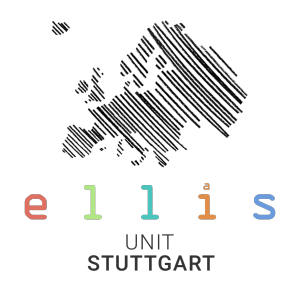| Zeit: | 6. März 2024, 11:30 Uhr |
|---|---|
| Universitätstraße 32.101, Campus Vaihingen of the University of Stuttgart. The talk will take place in person. | |
| Download als iCal: |
|
The Stuttgart ELLIS Unit is pleased to announce the upcoming ELLIS Distinguished Lecture Series talk by Gerhard Neumann (Karlsruhe Institute of Technology).
No reservation required - we are looking forward to seeing you there!
The talk will take place in Universitätstraße 32.101 and will be followed by an informal reception during which finger food and drinks will be provided.
Title: Versatile Imitation Learning and Reinforcement Learning with Motion Primitives in Robotics
Abstract:
In this talk, I will present our recent activities on imitation learning and reinforcement learning in robotics. I will give an overview of motion primitives (MP) in robotics, which have been used very successfully for smooth motion generation, and discuss their pros and cons in comparison to standard action-based policies. Here, I will also introduce a novel MP representation, called Probabilistic Dynamic Movement Primitives (ProDMPs), that can be easily embedded in a neural network architecture while guaranteeing smooth motion generation. In terms of imitation learning, I will present novel augmented reality-based user interfaces that can be used for low-effort data generation. Using this interface, we collected versatile benchmark datasets for evaluating recent imitation learning algorithms. Here, diffusion-based policies show convincing performance. Toward this end, we extend the ProDMP framework with diffusion-based policies to represent versatile behavior while guaranteeing smoothness. Regarding reinforcement learning (RL), I will show the beneficial exploration properties of MPs if we explore in the parameter space of MPs instead of in the action space of the robot. Toward this end, I will introduce MP-based RL algorithms that abstract the RL problem as a black-box optimization problem where the algorithm needs to choose the MP parameters instead of low-level control actions. We introduce a novel RL algorithm that is based on differentiable trust region projection layers and is well suited for RL problems with such high-dimensional action spaces and extend this algorithm for replanning and learning versatile behavior. In the end, I will give an outlook on how learning from human feedback approaches can make reinforcement learning more applicable to practitioners without the requirement of defining complex reward functions.
Bio:
Gerhard Neumann is a full professor at the KIT and heading the chair "Autonomous Learning Robots" since Jan. 2020. Before that, he was group leader at the Bosch Center for AI and industry on campus professor at the University of Tübingen (from March to Dec. 2019) and full professor at the University of Lincoln in the UK (2016-2019). Gerhard completed his PhD in 2012 at the TU Graz and was afterwards PostDoc and Assistant Professor at the TU Darmstadt.
His research is focused on the intersection of machine learning, robotics and human-robot interaction. His goal is to create data-efficient machine learning algorithms that that are suitable for complex robot domains, which includes learning from human feedback, versatile skill learning, learning learning to manipulate deformables, multi-agent reinforcement learning as well as fundamental research in machine learning such as variational inference or meta-learning.


